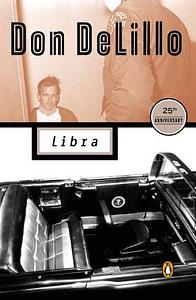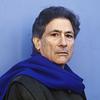Take a photo of a barcode or cover
dark
informative
medium-paced
An excellent fictionalized version of the Kennedy assassination, alternating between the life of Oswald, and a CIA conspiracy to drum up support for Cuba that quickly spirals out of control. Confusing at times, but then shouldn't conspiracies be a little confusing? A much better entry point to DeLillo than the other books of his that I've read (Underworld is massive, White Noise is annoying).
Ok, now I've read two DeLillo books, and I definitely liked this one a lot more than White Noise. Takes a while to get going, but really builds to something fascinating--a comment on the uncertainty of major events that still manages to find tragedy and horror in the participants. I'm curious as to how much of this is whole cloth fiction and how much is DeLillo playing with established conspiracy theories, but even without being sure, this worked well.
Libra (1988) deals with a tragic event of John F. Kennedy’s assassination and the episodes that led up to it. As I was reading this novel, I kept asking myself: “Where do the facts end and where does fiction begin?” DeLillo acknowledges in the end that this is a work of imagination, and he says that he “altered and embellished reality, extended real people into imagined space and time, invented incidents, dialogues, and characters.” Whatever the case may be, Libra is one of the saddest books I’ve read this year and the events described in this novel may have occurred.
The novel follows two narrative threads: one dealing with Lee Harvey Oswald’s life and the other dealing with the participants in the conspiracy to assassinate JFK. Both threads are loosely connected and they meet in the end. One thing that DeLillo does well is humanizing Lee Harvey Oswald. The reader gets to understand what events brought him to the ultimate decision to assassinate the President of the United States. I had no idea that he lived a portion of his life in Soviet Union where he met and married a woman named Marina. We also learn a lot about the conspiracy to assassinate JFK and its participants. This area of the novel is heavily debated due to its speculative plot elements. We may never know what occurred in the months, weeks, and days prior to the assassination, but DeLillo certainly doesn’t shy away from presenting his case to the reader. Again, DeLillo stated that this is NOT a non-fiction novel, so everything must be taken with a grain of salt.
This book is not for everyone, but I would recommend it to any fans of biographical fiction and literary fiction. The mood of this novel is bleak, suspenseful, and occasionally disturbing, so be prepared for that. If you feel like you don’t know enough about the assassination of John F. Kennedy but would like to learn more (that was me prior to picking up Libra), this novel would be perfect for you. My only complaint is that the prose felt dry at times, which kind of surprised me because I adored DeLillo’s prose in White Noise (1985). Occasionally, I felt like I was reading a Wikipedia article rather than a work of fiction. Other that that, I found this book to be intriguing, informative, and thought-provoking. 3.5 stars.
The novel follows two narrative threads: one dealing with Lee Harvey Oswald’s life and the other dealing with the participants in the conspiracy to assassinate JFK. Both threads are loosely connected and they meet in the end. One thing that DeLillo does well is humanizing Lee Harvey Oswald. The reader gets to understand what events brought him to the ultimate decision to assassinate the President of the United States. I had no idea that he lived a portion of his life in Soviet Union where he met and married a woman named Marina. We also learn a lot about the conspiracy to assassinate JFK and its participants. This area of the novel is heavily debated due to its speculative plot elements. We may never know what occurred in the months, weeks, and days prior to the assassination, but DeLillo certainly doesn’t shy away from presenting his case to the reader. Again, DeLillo stated that this is NOT a non-fiction novel, so everything must be taken with a grain of salt.
This book is not for everyone, but I would recommend it to any fans of biographical fiction and literary fiction. The mood of this novel is bleak, suspenseful, and occasionally disturbing, so be prepared for that. If you feel like you don’t know enough about the assassination of John F. Kennedy but would like to learn more (that was me prior to picking up Libra), this novel would be perfect for you. My only complaint is that the prose felt dry at times, which kind of surprised me because I adored DeLillo’s prose in White Noise (1985). Occasionally, I felt like I was reading a Wikipedia article rather than a work of fiction. Other that that, I found this book to be intriguing, informative, and thought-provoking. 3.5 stars.
dark
mysterious
reflective
slow-paced
Plot or Character Driven:
A mix
Strong character development:
Complicated
Loveable characters:
Complicated
Diverse cast of characters:
Yes
Flaws of characters a main focus:
Yes
I’d only read White Noise by him before and wasn’t a huge fan of it. This is much better, and partly because the problems I had with DeLillo in White Noise (like the lack of unique characterization in dialogue), while still present here, detract much less from the book. I think his prose also stepped up a level, and there are incredibly strong passages here. Must-read if you have any fleeting interest in the John F. Kennedy assassination, Cold War foreign policy, or clandestine government activity.
DeLillo anduvo para que James Ellroy pudiera correr.
What a journey! While it does seem tediously involute at times in the middle, it all comes together in the end and the conspicuous bypasses into character history will reveal the hidden purpose of setting the American Experience so as to assist the explosion in the end.
"Everything is supposed to be something. But it never is. That's the nature of existence." (65)Don DeLillo: American novelist, or poet specializing in novel-length free verse?
3.5 stars. I felt too far removed from the Kennedy assassination to grow super invested in the plot, but holy cow can this DeLillo guy write. Character building, world building, inner world building, an ear for dialogue, an eye for detail... I'm fawning now, and really the only reason I can't seem to go a full five stars is because I read Underworld first.
Intense, exciting read... the momentum of which is gradually lost, or loses itself towards the end, as paths tangle together and characters show up in the same places, on the same days. The character of Lee Harvey Oswald is exceptional from birth to grave... a desperation to handle his own beliefs manifests throughout, as he is repeatedly lured back to the commercialism he loathes. The passages detailing Jack Ruby's daily routines are hilarious and punchy, he did this, he did that, although oddly he never seems in control of his own destiny. But the puppet strings manipulated by Everett, Banister, Mackey have as much bearing on the outcome of the plot as the evolving consciousnesses of Oswald and Ruby.
Typical DeLillo, happily, although with less inconsequential observation and dialogue, and an atypically solid narrative planned and woven expert.
Typical DeLillo, happily, although with less inconsequential observation and dialogue, and an atypically solid narrative planned and woven expert.






